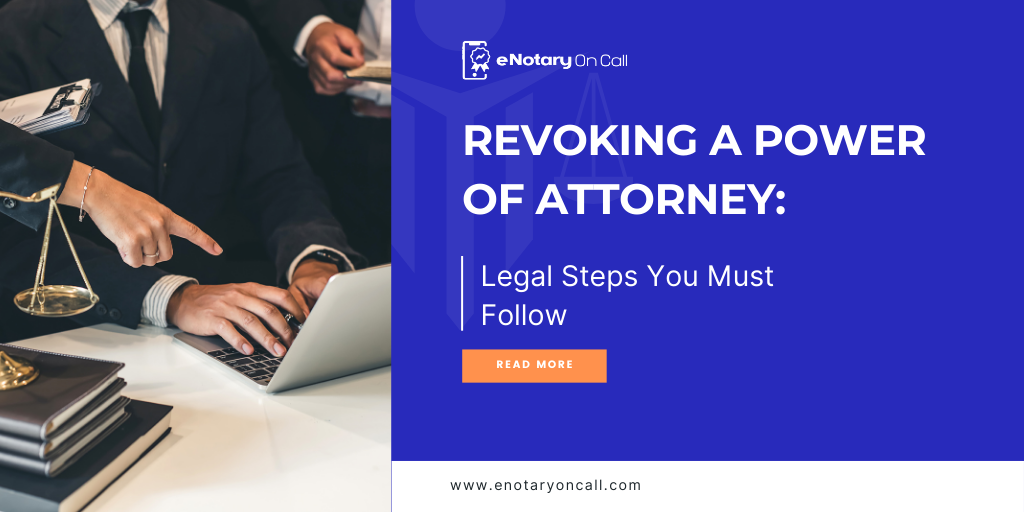Power of Attorney (POA) is a very significant legal document that empowers someone to make choices on your behalf. While it also offers peace of mind, there will always be a scenario when it must be revoked. That might occur due to the shift of situation, loss of trust, or simply due to a change of heart.
Identifying the correct legal processes for revocation of POA keeps your wishes legally protected and prevents any illegal operations.
What is a Power of Attorney?

Power of Attorney refers to a legal document that grants authority for one individual (the agent, or attorney-in-fact) to act on behalf of another individual (the principal, or also called the grantor or principal person) for particular matters. These matters vary from monetary decisions to health decisions, and so on, based on the kind of POA.
There are different types, such as a general power of attorney, an extraordinary power of attorney, and a medical power of attorney. All of them allow for varying degrees of authority, so it helps if you know which kind you have active.
Why You Might Revoke a Power of Attorney?
There are actually several standard reasons for which rescinding of the POA would be considered:
- Relationship Change: A divorce, a rift with the agent, or the death of the agent might make revocation necessary.
- Loss of Trust: In case you feel that the agent has not been working in your best interest or has been misusing their authority, there should be immediate revocation.
- New Agent: You might simply wish to appoint a new agent.
- Fulfilment of Purpose: In case the POA has been given for an intended task that has been completed.
Steps to Revoke a Power of Attorney
The process of revoking a POA needs to be handled carefully to ensure it is legally binding.
1. Create a Revocation of Power of Attorney Form or Letter
First and foremost, establish a formal POA revocation form or POA revocation letter. The document must express your clear intent to withdraw the current Power of Attorney. It should include:
- Your complete legal name and residence (the principal).
- The agent, full legal name and address if its authority is being revoked.
- The original date the document of Power of Attorney was signed.
- A specific declaration that you are withdrawing all authority vested under the initial POA.
- The date of effectiveness of the revocation.
2. Sign and Notarize the Document of Revocation
Just like the original power of attorney form, the revocation document must be signed by you, the principal, and power of attorney notarization is typically required.
Notarization adds an extra layer of legal validity, confirming your identity and that you signed the document willingly. In many jurisdictions, a notary public is required to witness your signature.
3. Notify All Involved Parties
Once the document of revocation has been signed and witnessed, it is very important that everyone potentially affected by the change is notified. These include:
- The Agent: You are required to give the agent a copy of the letter of revocation. You might want to send it by certified mail with a return receipt requested so that there will be delivery confirmation.
- Financial Institutions: In the event the POA addressed finances, give notice to all banks, investment houses, and other financial institutions at which the agent potentially exercised authority.
- Healthcare Providers: In the case of a medical power of attorney, let your physicians, hospitals, and other healthcare providers know.
- Other Third Parties: All those who have depended on the original POA must be notified.
4. Register the Revocation (in case of originally recorded POA)
In the event the initial power of attorney has been registered with a county recorder’s office (as is usually the case with POAs related to land ownership), you should also register the document of revocation with this same office. That will give public notice that the initial POA has ceased to have any legal force.
Online Notarization of Your POA Revocation
In the modern era of digital communication, cancellation of POA can be accomplished via Remote Online Notarization Platforms (RON). You are able to get your document of revocation notarized from anywhere without physically appearing with a notary. In the context of the notarization via RON, you connect remotely with a commissioned notary via an encrypted audio-visual connection.
The notary sees your identification and establishes it via strong authentication procedures, watches your electronic signature, and subsequently places their digital seal on the document. This easy process ensures your document of revocation bears legal validity while sparing your time and energy.
How to Notarize Your POA Revocation Online?
To Notarize Your POA Revocation Online, Do the Following:
- Select a RON Platform: Visit the website of a credible and law-abiding Remote Online Notarization platform such as eNotary On Call.
- Upload Your Document: Upload your completed POA revocation document or letter on the website.
- Identity Verification: You will also face secure identity verification, usually consisting of knowledge-based authentication questions and credential analysis.
- Meet with a Notary: Connect with an active, commissioned notary via audio-video technology conference.
- Signature and Seal: The notary official sign the document will then use their electronic seal to notarize document.
- Get Your Notarized Document: You will get a digitally signed and sealed document of your rescinded POA, which can be distributed.
Conclusion
Terminating a power of attorney is a serious legal matter that needs utmost care and precision. Following these procedures – writing a clear document of revocation, ensuring proper power of attorney notarization (which can also be facilitated via easy Remote Online Notarization), and notifying all involved parties – will allow you to properly revoke an existing POA and protect your interests.
In case you are not quite clear on any step of the process, it will always be best to seek the advice of a lawyer so that proper regulations of your state are adhered to and the proper forms of power of attorney are utilized.
Frequently Asked Questions
Q1. Can a Power of Attorney be revoked?
Yes, the person who created it (the principal) can revoke it anytime as long as they are mentally competent.
Q2. How do I revoke a Power of Attorney?
You need to create a written revocation document, sign it, and notify your agent and relevant institutions.
Q3. Do I need to notarize the revocation?
In most cases, yes. A notarized revocation adds legal validity and prevents disputes.
Q4. Who should I inform after revoking?
Inform your agent, banks, healthcare providers, and anyone who relied on the POA.
Q5. Can I revoke a Power of Attorney verbally?
Verbal revocation is not recommended; a written, notarized revocation is legally stronger.
To get your revoke POA notarized, sign up for eNotary On Call.



